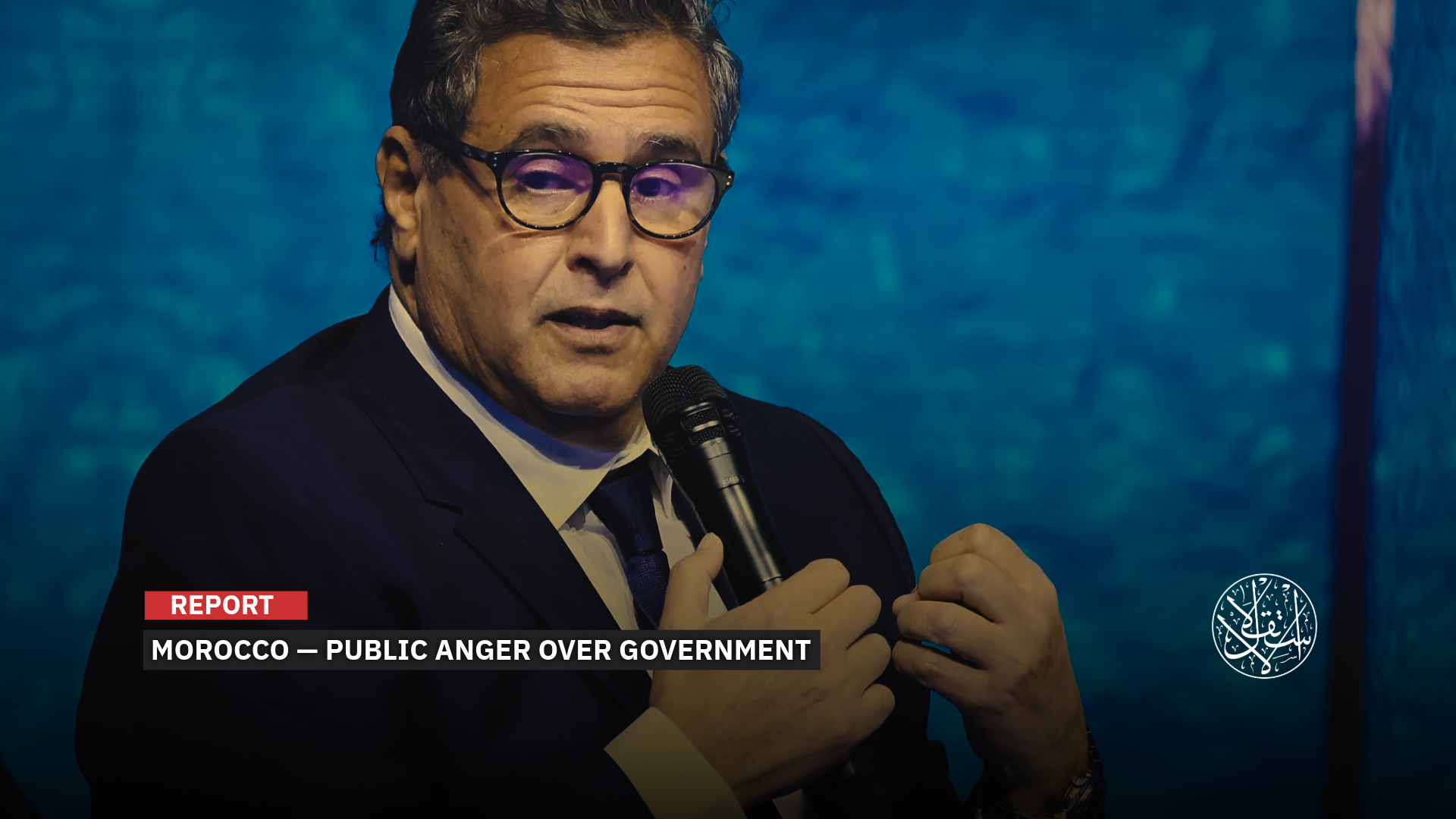Negative Signals: Why Moroccans Are Angry Over Akhannouch’s Visit to the Italian Coast

This move cannot be separated from the broader context Morocco is going through.
A wave of controversy has swept Morocco after Prime Minister Aziz Akhannouch was seen spending his summer holiday on the Italian island of Sardinia, at a time when the kingdom is grappling with a deteriorating economy marked by soaring prices and high unemployment.
A leaked video circulated on August 8, 2025, showed Akhannouch with members of his family inside a well-known restaurant on the island, one of the most exclusive destinations in the Mediterranean.
Local media reported that he arrived at the restaurant by private service boat, where he lunched for about 3,000 euros and left a tip of 200 euros for the waitress, details that fueled the rapid spread of the story across social media platforms.
A Symbolic Detachment
Political activist Mohamed Taher noted that every public official, whatever their rank, is entitled to time away from the pressures of office, and that there is nothing unusual about spending such a break abroad.
Speaking to Al-Estiklal, he said that the choice of Sardinia may simply reflect a natural desire to escape the routines of responsibility and enjoy some privacy.
Yet, he added, the move cannot be separated from the broader context in Morocco, where large segments of society face mounting economic and social hardship, particularly in the summer months when crises such as inflation and drought intensify.
Against this backdrop, he suggested, lavish holidays risk being perceived as a form of symbolic detachment from the struggles of ordinary people, even if they remain legitimate on a personal level.
He stressed that these moments could instead have been used to send indirect signals of solidarity, whether by supporting domestic tourism or by adopting gestures that reflect symbolic and human connection with citizens in such a delicate period.
For Omar Arbib, vice president of the Moroccan Association of Human Rights, the criticism stems from contradictions that have marked Mr. Akhannouch’s tenure, shared by other officials including the current tourism minister, Fatim-Zahra Ammor.
In remarks to The Voice on August 9, Arbib said that while officials urge Moroccans to support domestic tourism, the behavior of the prime minister does not match these calls in practice.
He argued that the controversy reflects a public expectation to see their head of government simultaneously working to ensure that tourism in Morocco offers decent services at reasonable prices.
Arbib urged Mr. Akhannouch to compare the quality of services he encounters abroad with what Morocco provides to tourists and returning expatriates.
The prime minister, he emphasized, must confront the realities of the domestic tourism sector and offer genuine solutions to the structural problems of high costs and poor services, including those affecting Moroccans living overseas.

A Tourism Crisis
Blogger Hicham Lahreche said the prime minister has every right to spend his vacation abroad, whether in Sardinia, Georgia or even the Arctic.
But in a Facebook post on August 8, he added that Mr. Akhannouch, as president of the municipal council of Agadir, has no right to take his holiday outside the country while local voices in the tourism sector are sounding the alarm that the southern capital is enduring its worst season in years.
He noted that it was within Akhannouch’s rights, as a man of considerable wealth, to spend three thousand euros on a single lunch on the shores of Sardinia, enjoying with his family the charms of Italy.
Yet, he added, it was hardly appropriate for the prime minister, who manages the national budget, to spend such a sum abroad while Morocco borrows from foreign creditors and every summer urges its diaspora to spend their holidays at home through the Marhaba program.
He argued that it was Akhannouch’s right to shield his face with a hat as he slipped away from cameras seeking to capture his departure, but not his right to proclaim that Morocco had achieved a qualitative leap under his leadership when every indicator pointed instead to his government being the worst in the country’s modern history.
The local outlet Nichan reported that the episode left Akhannouch feeling deliberately targeted, particularly as it occurred during a sensitive period when his administration faced mounting criticism. The choice of an opulent foreign destination, the outlet said, stood in stark contrast to his government’s rhetoric promoting domestic tourism.
In a report published on August 8, Nichan noted that the leak embarrassed the prime minister’s communications team, which suddenly confronted a double bind: containing the spread of the images while countering public outrage over what many saw as a glaring contradiction between his official calls to support domestic tourism and his personal decision to vacation abroad in luxury.
The incident recalled earlier criticism of Tourism Minister Fatim-Zahra Ammor, who spent a holiday in Zanzibar in 2022 amid a sharp downturn in Morocco’s tourism sector following the 2022 coronavirus pandemic.
Despite repeated official appeals to bolster domestic tourism, Investment Minister Karim Zidan also drew mixed reactions after spending his summer vacation abroad in 2025, only weeks after praising the Mediterranean resort town of Saidia and urging Moroccans to holiday at home. His choice underscored once more the gulf between official messaging and the conduct of senior officials.
Domestic tourism in Morocco faces profound challenges, not least a surge in prices that has deterred citizens from traveling within the country and depressed activity across the sector, particularly in cities like Agadir, where mismanagement has exacerbated local tourism woes.
Against this backdrop, citizens and political figures alike are calling on the government to adopt urgent measures to curb rising costs, support local investors, and raise the quality of tourism services. They stress that senior officials must also set an example, projecting confidence and strengthening trust by embracing the very domestic tourism they seek to promote.

Diverting Attention
After the uproar over Sardinia, Akhannouch’s supporters widely circulated a photograph of him strolling through a public garden in Agadir on the night of August 18, an effort seemingly aimed at recasting the moment into a political gesture underscoring his closeness to ordinary citizens.
Observers noted that the timing of the photograph’s release was hardly accidental. It came in the wake of a wave of criticism directed at the prime minister, at a time when his government was urging citizens to bolster domestic tourism through official campaigns.
For many, the promotion of an image of Akhannouch walking in a park in a city where he has served as mayor since 2021 seemed less an exceptional moment worthy of attention than a deliberate attempt to deflect from the ongoing controversy.
“Akhannouch, the prime minister and mayor of Agadir, took a walk in al-Inbiaat Park, and his communications team promoted the event heavily on social media and in the press,” journalist Rida Taoujni posted on Facebook.
“I would have preferred to see Akhannouch touring Hassan II Hospital, listening to patients and their families as well as doctors and nurses about the dire conditions under which they are forced to work.”
Opponents expressed astonishment at Akhannouch’s absence from thirty-five municipal sessions he was meant to preside over, only to appear this summer in a brief nighttime stroll through the city’s gardens. They described the moment as unprecedented in the history of local governance.
Political activist Jawad Faraji, commenting on Akhannouch’s quick visit, said, “Thanks be to God, our mayor carried out in a few short minutes an inspection tour of one of Agadir’s safest and most symbolic gardens, after having missed thirty-five city council sessions and attended only six meetings, even as we near the end of the term.”
Faraji noted in remarks to the press on August 20 that “the remarkable aspect is the way our wonderful local press, professional as ever, was mobilized to glorify this visit, placing it at the forefront of the news while the city reels from the mismanagement of the summer season, failures in sanitation, traffic problems, and the chaos of public space.”
Sources
- Between Vacation Extravagance and the Pressure of Crisis: Akhannouch Vacation Comes Under Fire [Arabic]
- Nichan Reveals the Details of Akhannouch Anger after his Photos in Sardinia Were Leaked [Arabic]
- Widespread Debate as Aziz Akhannouch Spends Summer Vacation in Italy Amid Morocco’s Domestic Tourism Crisis [Arabic]












